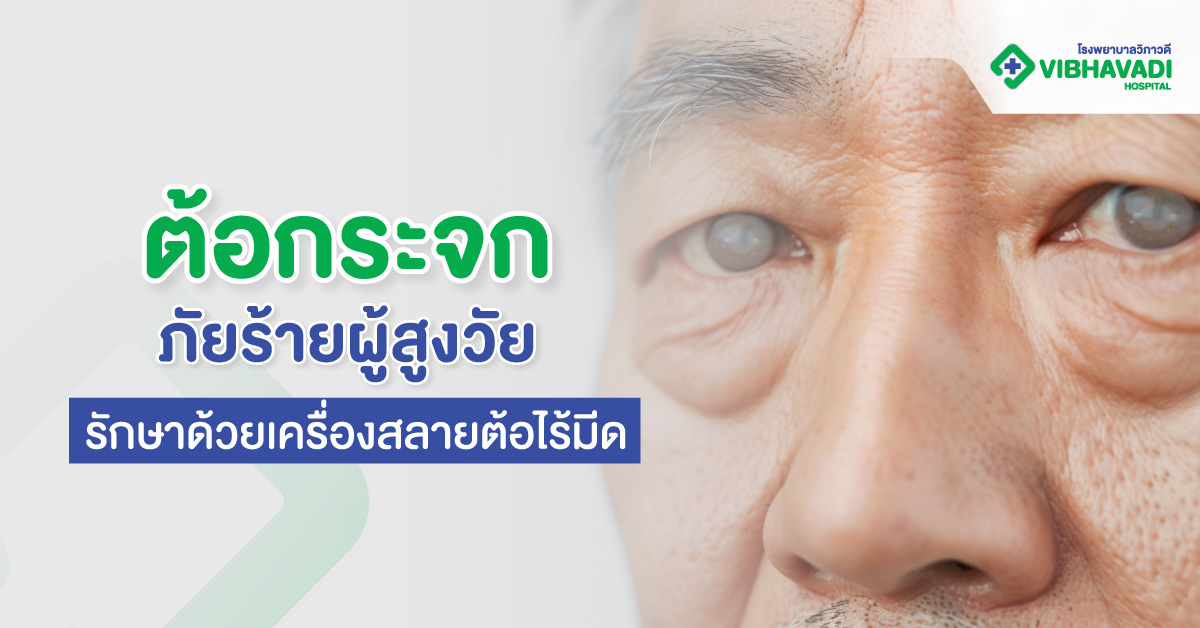Cataracts in Seniors

Cataracts in Seniors: Safe Bladeless Phacoemulsification Surgery
Key Takeaway
Cataracts are a condition where the normally clear and transparent lens of the eye becomes cloudy, reducing the amount of light reaching the retina. This leads to blurred or impaired vision, most commonly in older adults. Symptoms include blurry vision, dull or faded colors, light sensitivity, or seeing halos around lights.
Treatment with bladeless phacoemulsification involves using ultrasound waves to break up the cloudy lens, which is then removed and replaced with an intraocular lens (IOL). The procedure is minimally invasive, allows quick recovery, and restores clear vision rapidly.
Cataracts: The Silent Threat to Aging Eyes
Cataracts gradually cloud the lens, causing blurred vision and difficulty seeing clearly. Early detection allows effective treatment to restore vision. Vibhavadi Hospital offers comprehensive eye exams and bladeless phacoemulsification with high-quality intraocular lenses to help patients regain clear vision.
What Are Cataracts?
Cataracts are a clouding of the natural lens of the eye, reducing or distorting the light entering the eye, resulting in blurry vision. They usually develop due to aging but can also result from eye injuries, diabetes, or certain medications.
Early cataracts may not be noticeable, but as the lens becomes more opaque, vision blurs, colors fade, and bright light causes glare. Untreated, cataracts can significantly impair vision over time.
Causes of Cataracts
Several factors contribute to cataract formation:
-
Aging: Natural wear and tear of the lens and surrounding tissues increase cataract risk.
-
Family history: Genetics can increase susceptibility.
-
Medical conditions: Diabetes and other eye-related diseases can accelerate lens clouding.
-
Medications: Long-term steroid use may trigger lens opacity.
-
UV exposure: Excess sunlight without eye protection can speed up lens deterioration.
-
Eye injuries or surgeries: Trauma can damage the lens and cause clouding.
Recognizing Cataract Symptoms
Cataracts cause blurry vision, glare, double images, or difficulty seeing at night. Symptoms progress in stages:
Stage 1 – Immature Cataract
Mild lens clouding; occasional blurry vision; minimal impact on daily life.
Stage 2 – Developing Cataract
Increased cloudiness; colors fade; occasional glare or double vision.
Stage 3 – Mature Cataract
Significant vision impairment; blurry most of the time; night vision difficulty; glare is prominent.
Stage 4 – Hypermature Cataract
Lens may shrink or liquefy; high risk of inflammation or glaucoma; vision severely impaired; surgery is usually required.
Cataract Diagnosis
Diagnosis involves a thorough eye examination:
-
Medical history & initial eye exam: Assess vision changes, color perception, night vision, medications, injuries, and family history.
-
Visual Acuity Test: Measures clarity of vision at various distances.
-
Slit Lamp Examination: Evaluates lens and eye structures to locate cataracts.
-
Tonometry: Measures intraocular pressure to detect glaucoma risk.
-
Fundus Examination: Assesses retina and optic nerve health.
-
Additional imaging (if needed): OCT or ultrasound for detailed lens and internal eye structure analysis.
Cataract Treatment
Treatment depends on severity:
Non-surgical Management
For early-stage cataracts: glasses, light adjustments, or UV-filter lenses can help maintain vision temporarily.
Surgical Treatment
Phacoemulsification (bladeless ultrasound) removes the cloudy lens and replaces it with a high-quality intraocular lens (IOL). The procedure typically lasts 20–30 minutes per eye, allows same-day discharge, and vision improves within days.
Preparing for Cataract Surgery
-
Avoid strenuous activities and get adequate rest.
-
Follow medical instructions regarding food, medications, and hygiene.
-
Plan transport and post-surgery care, as driving is not permitted.
-
Prepare essential items like sunglasses, prescribed eye drops, and ID.
-
Maintain a calm and informed mindset.
Postoperative Care
-
Rest your eyes and limit screen time.
-
Use prescribed medications to prevent infection and inflammation.
-
Protect eyes from sunlight and debris using sunglasses or protective gear.
-
Avoid heavy lifting or strenuous activity initially.
-
Monitor for unusual symptoms like severe redness, pain, blurred vision, or halos.
-
Maintain a healthy diet and inform your doctor about any medications.
Preventing Cataracts
-
Wear UV-blocking sunglasses and wide-brim hats outdoors.
-
Eat a diet rich in vitamins A, C, E, antioxidants, vegetables, fruits, fish, and nuts.
-
Manage chronic conditions like diabetes and high blood pressure.
-
Avoid smoking, excessive alcohol, and eye strain.
-
Practice good eye hygiene and schedule regular eye exams at least annually.
Cataract Care at Vibhavadi Hospital
Vibhavadi Hospital’s Eye Center provides full cataract care, from assessment to treatment planning, using advanced technology like bladeless phacoemulsification and high-quality IOL implantation for safe, rapid recovery and clear vision restoration.
Summary
Cataracts are a clouding of the eye lens causing blurry vision, faded colors, and glare, commonly due to aging, genetics, chronic diseases, medications, UV exposure, or trauma. Symptoms include blurry vision, night vision difficulty, double vision, and color changes. Diagnosis involves visual tests, slit lamp exams, tonometry, fundus exams, and special imaging. Treatment depends on severity and includes non-surgical management or surgical phacoemulsification with IOL implantation. Early detection, lifestyle adjustments, and protective care can slow progression and preserve vision.
Frequently Asked Questions (FAQ)
Can cataracts heal on their own?
No, cataracts do not resolve without surgery. Medications or eye drops cannot restore a clear lens. Surgery is the only effective treatment.
What is recovery like one month after surgery?
Vision typically improves significantly; eye irritation usually resolves, and daily activities can resume. Follow-up exams ensure proper recovery.
Is cataract surgery painful?
Most patients experience minimal discomfort due to local anesthesia. Mild irritation may occur but improves within days.
Can I drive after cataract surgery?
Vision improves within a few days, but driving is usually restricted for 1–2 weeks or until the doctor confirms safe vision.
Testimonials
Proud to take care of you



























